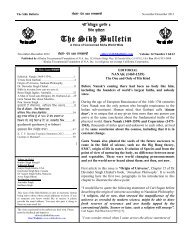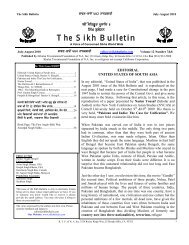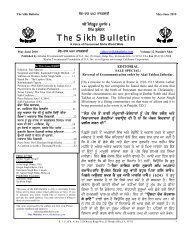Selected Editorials - The Sikh Bulletin
Selected Editorials - The Sikh Bulletin
Selected Editorials - The Sikh Bulletin
You also want an ePaper? Increase the reach of your titles
YUMPU automatically turns print PDFs into web optimized ePapers that Google loves.
established tradition; as Mr. Tohra had explained away the unsikh practice of denial of sewa to the<br />
women at Harmander Sahib because of the long established tradition. <strong>The</strong> fact that Guru Nanak had<br />
broken many traditions going back centuries was inconsequential.<br />
Bhai Ardaman Singh, a <strong>Sikh</strong> scholar of yore, in his book ‘Thoughts of Bhai Ardaman Singh’ writes, “In<br />
<strong>Sikh</strong>ism, certain philosophical interpretations are common with Hindu thought, like life after<br />
death,…while such concepts as Oneness of God…<strong>Sikh</strong>ism is nearer to Islam than to Hinduism.”<br />
Unfortunately, he is dead wrong on both counts. As for the comparison with Hinduism Dr. Baldev<br />
Singh’s article, which is this entire issue, explodes that myth. Comparison with Islam and the other two<br />
Middle Eastern religions, Judaism and Christianity, all three the people of the Book and believers in One<br />
God, is also not kosher. Although all three believe in One God and share historical personalities, each<br />
one of them has their own separate One God. Jews claim to be the chosen people of their God who<br />
bequeathed for eternity strictly for them the lands of Palestine and they are still waiting for their Messiah.<br />
Christian God delivered his own son to die for the sins of only those who will accept his son as their<br />
savior and had him crucified but only to raise him from the dead to come back to the earth for the second<br />
and the last time. Muslim God declared Mohammed the last prophet among the peoples of the book, with<br />
no more to come. Guru Nanak does not agree with any of it. His God is loving and merciful God of the<br />
entire universe and all the creation in it.<br />
In this issue we are presenting a revolutionary interpretation of Gurbani by Dr. Baldev Singh. It will, no<br />
doubt, cause controversy. We would welcome reasoned response to further the intellectual discussion that<br />
involves the use of ‘bibek budhi’.<br />
Hardev Singh Shergill<br />
[Editor’s Note: Entire January-February 2009 issue of <strong>The</strong> <strong>Sikh</strong> <strong>Bulletin</strong> was devoted to the<br />
writings of Dr. Baldev Singh. It can be accessed at www.sikhbulletin.com . <strong>Sikh</strong> qaum suffered a<br />
great loss when Dr. Baldev Singh passed away on October 1, 2009 at Yuba City, California.]<br />
*****<br />
EDITORIAL<br />
WHO IS A SIKH<br />
[Editorial from March-April 2009 <strong>Sikh</strong> <strong>Bulletin</strong>]<br />
“A person, who follows <strong>Sikh</strong>i (Gurmat/<strong>Sikh</strong>ism) that is based on Gurbani, incorporated in the Aad Guru<br />
Granth Sahib by Guru Arjan, and Guru Gobind Singh, the Fifth and Tenth Gurus in succession to the<br />
‘House of Nanak’ (Mahla), respectively, is a <strong>Sikh</strong>. Consequently, that person is the follower solely of<br />
<strong>Sikh</strong>ism and does not practice any other religion simultaneously.” This is the suggested definition of a<br />
<strong>Sikh</strong> by Dr. Devinder Singh Chahal in his article on page 2 in which he details various definitions as<br />
enshrined in the <strong>Sikh</strong> Gurdwara Act 1925, Mahan Kosh, SGPC Rehit Maryada, and Delhi <strong>Sikh</strong> Gurdwara<br />
Management Committee (DSGMC) Constitution, and to which this writer can subscribe.<br />
Notable omission in this definition is the issue of hair that started the current controversy in Panjab over<br />
denial of admission to SGPC operated Medical College to a <strong>Sikh</strong> girl because she trims or plucks her eye<br />
brows. But even so, only one of four legal definitions, DSGMC’s, includes the requirement of unshorn<br />
hair. But why get lost in manmade definitions. Why not look to Guru Granth Sahib for guidance in<br />
defining a <strong>Sikh</strong> That is precisely what Avtar Singh Missionary has done on page 27. He points out one<br />
relevant statement from GGS: kbIr pRIiq eyk isAuN kIey afn duibDf jfie] BfvY lFby kys kru BfvY Grir muzfie]<br />
GGS p. 1365.<br />
In the past I used to hear the words "Saabat soorat dastaar sira" from the GGS in defense of uncut hair<br />
requirement in <strong>Sikh</strong>i. Lately I have come across another phrase, “Hukam rajai chalnaa Nanak likhia<br />
48
















